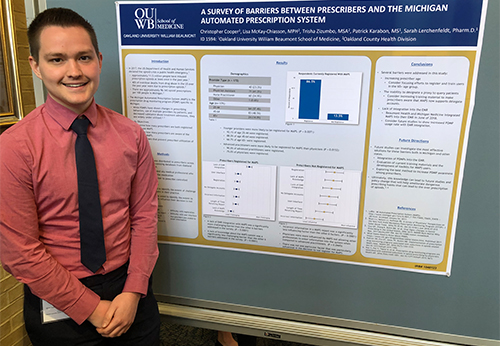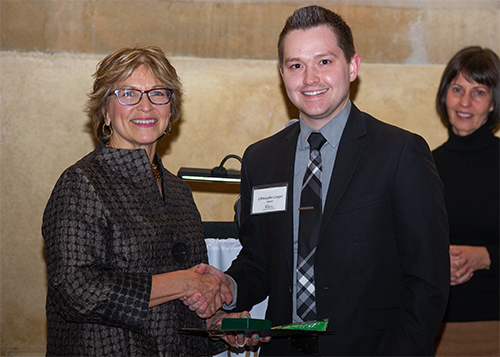
An Oakland University William Beaumont School of Medicine student project has identified problems with Michigan’s prescription-tracking database — and local officials hope it helps tackle the state’s devastating opioid addiction epidemic.
“A Survey of Barriers Between Prescribers and the Michigan Automated Prescription System” is a project led by fourth-year OUWB student Chris Cooper.
The project won first place in the category of Public Health at the National Student Research Forum held at the University of Texas Medical Branch in Galveston, Texas.
Cooper said his intent was to identify and spotlight problems with the Michigan Automated Prescription System (MAPS) — issues that he says limit the drug-tracking system’s effectiveness in battling the state’s ongoing opioid addiction crisis.
“The goal of our research was to identify the barriers that keep prescribers from using (MAPS) so that we can make suggestions to local health departments versus the state level, make it a lot more user-friendly, and hopefully increase its usage rate,” Cooper said.
Patrick Karabon, OUWB biostatistician and one of the co-authors on the project, said Cooper’s project was a first of its kind.
“While other states have looked at barriers to implementing their own Prescription Drug Monitoring Programs (PDMPs), no evaluation has been done to date in Michigan,” he said.
Karabon said the project benefited from the connection to the representatives from Oakland County and Oakland Community Health Network.
Particularly, he said, because they “were able to distribute the survey throughout the entire state of Michigan.”
Lisa McKay-Chiasson, administrator, Oakland County Health Division, and Trisha Zizumbo, director of training, Oakland Community Health Network, are co-authors on the project. In a joint statement, they confirmed the importance of the work.
“The data from (the project) can help us identify barriers and challenges unique to Oakland County prescribers and allows for the Oakland County Health Division, Oakland Community Health Network, and the Oakland County Prescription Drug Abuse Partners to continue to work together on combating the opioid epidemic happening in our communities,” the statement reads.
Identifying the problem
According to the National Institute on Drug Abuse, deaths in Michigan related to overdose from prescription opioids rose from 378 in 2012 to 633 in 2017. NIDA also reports that Michigan providers wrote 74 opioid prescriptions for every 100 people.
State law requiring use of MAPS (with some exceptions) went into effect in June 2018.
Per the state of Michigan’s website, MAPS is used to track controlled substances and “a tool used by prescribers and dispensers to assess patient risk and is also used to prevent drug abuse and diversion at the prescriber, pharmacy, and patient levels.”
Simply put, MAPS is aimed at curbing “doc shopping,” or the practice of visiting multiple physicians to obtain multiple prescriptions.
 Cooper said he first started to question the effectiveness of MAPS while working outside of medical school with a local emergency department. Cooper, recently inducted into the Alpha Omega Alpha Honor Medical Society (see right), said that experience pushed him to pursue the issue further making it the focus of his OUWB Embark student research project.
Cooper said he first started to question the effectiveness of MAPS while working outside of medical school with a local emergency department. Cooper, recently inducted into the Alpha Omega Alpha Honor Medical Society (see right), said that experience pushed him to pursue the issue further making it the focus of his OUWB Embark student research project.
Embark is an OUWB required scholarly concentration that provides a mentored introduction to research and scholarship. The four-year longitudinal curriculum consists of structured coursework in research design and implementation, compliance training, research communication, and scholarly presentation, with protected time to develop mentored projects in a wide-range of community and health-related settings.
Cooper said his project revealed that MAPS was “really underutilized.”
“Using MAPS is actually mandatory when prescribing narcotics,” Cooper said. “But some data is showing that’s not actually happening.”
“We need to figure out why it’s not (being used),” he added.
Project findings were based on survey responses received from nearly 200 physicians, physician assistants, and nurse practitioners.
Respondents identified various barriers to regularly using MAPS, including a complex registration process, interface that isn’t user-friendly, and general lack of knowledge about the system.
However, the biggest barrier respondents identified is lack of integration with electronic medical records (EMR) systems.
“The lack of integration with EMR is the biggest barrier,” said Karabon.
Looking ahead
Karabon said EMRs are large, complex, and interwoven in everything that health care providers do throughout the day. EMRs are also large financial investments for any health care provider and require a team of specialists to maintain the system, he said.
“While our clinical partner Beaumont has begun the integration of MAPS with its (system), this is a much more difficult challenge for many of the smaller community hospitals and physicians’ offices located throughout the state of Michigan,” Karabon said.
Karabon said health care stakeholders need to be aware of the problems that impact use of MAPS, especially the EMR issue.
“With prescribing providers spending the majority of their day in the EMR, having to use a second system to check the patient against MAPS is something that is inefficient and might dissuade these providers from using MAPS all the time,” Karabon said. “Hopefully this (project) will be a catalyst for health care systems and EMR providers to continue the discussion of integrating MAPS and other PDMPs with EMR systems.”
In their statement, McKay-Chiasson and Zizumbo said the project was useful in identifying a need to improve the use of MAPS.
“(The project) assisted in determining the challenges and barriers associated with utilizing MAPS and directly aligns with the Oakland County Prescription Drug Abuse Partnership's priorities to ensure and advocate for safe and competent opioid prescribing practices,” they said.
In addition to Cooper, McKay-Chiasson, Zizumbo, and Karabon, Sarah Lerchenfeldt, Pharm.D, OUWB assistant professor of Foundation Medical Studies in the discipline of pharmacology, was a co-author.
For more information, contact Andrew Dietderich, marketing writer, OUWB, at adietderich@oakland.edu.

